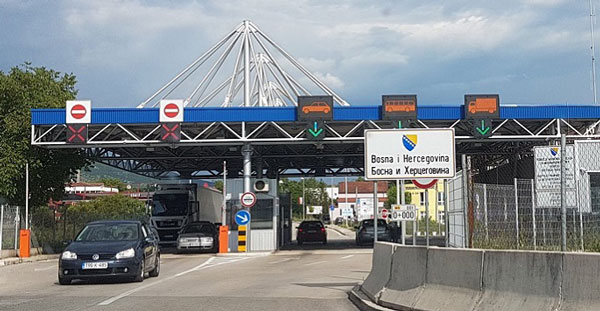How Covid-19 has highlighted the value of citizenship
Posted on: 10 November 2020 by Mate Subašić in 2020 posts

Mate Subašić is a PhD student at the University of Liverpool. His research is focused on nationalism, identity politics and trans-border groups in South East Europe. Within this blog post he discusses how Covid-19 has highlighted the importance of citizenship within Europe.
Dual citizenship and Covid-19 border management
The Covid-19 pandemic has highlighted the value of citizenship. Among other functions, citizenship determines individual’s entry rights to a particular country and provides access to different levels of public health service. Holding dual citizenship, therefore, provides individuals with additional opportunities.
My study on Croats in Bosnia and Herzegovina (BiH) who hold dual citizenship suggest that individuals frame their engagement with citizenship through three dimensions: instrumental, symbolic and inequality dynamics. Participants highlight the instrumental dimension of citizenship over symbolic attachments the citizenship offers vis-à-vis national belonging to Croatia, which is an EU member since 2013. This is particularly evident among younger participants I interviewed, who, besides, often recognise the impact citizenship has on inequalities between different ethnic communities in BiH.
The outbreak of Covid-19, and especially the travel restrictions imposed to slow the spread of the virus, further enhanced each of the three dimensions around which the individuals frame their experience and engage with dual citizenship. Croatia has first awarded additional financial resources to the hospital in Mostar (BiH), a symbol of the Croatian support for the wellbeing of the Croat community in BiH. In a later move, Croatia introduced a 14-day quarantine for people travelling from non-EU countries including BiH, except for citizens of the EU that includes Croats in BiH who hold Croatian citizenship.
Back in the 1990s, when Croatia introduced citizenship policies aimed to include Croats residing in BiH, due to the establishment of the international border seemingly splitting the ethnic community between Croatia and BiH, the policy was framed as a compensatory mechanism. The symbolic unity of the ethnic group was formalised but also contested by many in Croatia and BiH, not least for the Croatian involvement in conflict within BiH.
Besides the symbolic unity of the nation, throughout the conflict in BiH, citizenship certainly bared instrumental value for Croats in BiH providing a desperately needed sense of security. Either in the form of assurances that Croatia would engage should Croat ethnic community in BiH be threatened or as an exit strategy should the circumstances require individuals to leave BiH. But after the conflict, the dual citizenship became only a symbol of ethnic attachments expressed mostly through participation in Croatian elections and financial transfers coming from Croatia to support the education, wellbeing, and culture of Croat community.
When Croatia joined the EU in 2013 its citizenship gained an additional layer of prestige and value. Croatian citizens were granted additional opportunities, including the freedom to travel and (subject to a grace period) work within and beyond the EU. Individuals I talked to throughout my fieldwork each highlighted the impact EU citizenship has on their life prospects. They framed it as an insurance policy, as an opportunity should the situation in BiH, already one of the least developed countries in Europe, further deteriorate. Most individuals also emphasised the sense of advantage their citizenship status grants them in comparison to other citizens of BiH, particularly concerning employment opportunities abroad. Perceived (and real) inequalities and opportunities are most vividly experienced at the border crossings with Croatia. While members of the Croat community undergo less strict control and queue under the EU lane, other BiH citizens are treated as third countries’ citizens, making their crossing more complicated and time-consuming.

Croatia - BiH border crossing.
Hence, a modified border regime introduced as a response to Covid-19 outbreak contributed further to inequalities experienced at the border crossings. Soon after Croatia opened up its borders following the easing of lockdown measures, borders with non-EU neighbouring countries, including BiH, were again closed due to the significant infection rate differences. From June 24th all individuals from BiH, including those who hold dual citizenship were subject to 14-day self-isolation upon their arrival in Croatia. Dragan Čović, president of HDZ BiH, the main party representing the Croat community in BiH, who recently tested positive for Covid-19, reacted with a sense of reason. Despite the decision being ‘slightly annoying’ for Croatian citizens in BiH, he argued, they understand it, and the representatives of Croat community will engage with Croatian government hoping to convince them to change the decision. He also reiterated the (old) argument about ethnic unity, first used to justify the establishment of the border back in the 1990s, suggesting that the border, however hard it might be, cannot disunite Croats from the two sides.
Nevertheless, the border management was again altered on June 30th, conforming to the EU’s decision allowing all the EU citizens to enter and travel freely within the EU. Only ten days later when the former decision on self-isolation for citizens of BiH was extended, the public was made aware that the decision no longer includes the citizens of Croatia who reside in BiH. The decision caused public outrage in BiH, with people suggesting sarcastically that the ‘right passport can cure Covid-19’.
Far from being sarcastic, though, the case of Croats in BiH who hold dual citizenship indeed suggest the strength of the instrumental value of citizenship. That is especially evident in cases of high disparities in terms of development between two countries and the opportunities their citizenship offers within the international system. Not least, the opportunities it provides in terms of health care for its citizens. The recent publication by Yossi Harpaz, Dual Citizenship 2.0, suggests that individuals across the globe recognise too the instrumental value of citizenship, often regardless of or even in opposition to national attachments. Citizenship, he argues, determines the opportunities individuals have in today’s global system, and the growing toleration for dual citizenship across the globe inspire people to strategically seek the highest possible opportunities through the acquisition of a second citizenship.
Even if dual citizenship in case of transborder minority performs primarily a symbolic role of national unity, the changing dynamics within the international system contribute to instrumental reasoning behind the acquisition that goes beyond the symbolic attachment to the state. Covid-19 travel restrictions and border management have further confirmed that dual citizenship indeed provides additional opportunities for transborder ethnic communities.
*This blog was initially posted on The University of Edinburgh's Nationalism Studies blog.
Discover more
More about Mate and his research.
Study Politics at the University of Liverpool.
Keywords: University of Liverpool, Research, Liverpool, Politics, Citizenship, Covid-19.